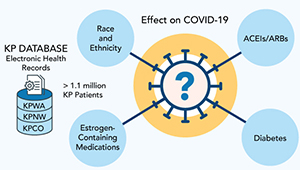Susan Shortreed, PhD
Biography
Susan Shortreed, PhD, uses statistics and machine learning methods to address health science problems, with a special emphasis on analyzing complex longitudinal data. She develops and evaluates statistical approaches for observational data, and works to improve the design and analyses of studies that use data collected from electronic health care records. She is leading a project to develop statistical methods for constructing personalized treatment strategies using data captured from electronic health records.
Dr. Shortreed earned her PhD in statistics from the University of Washington. Then she spent two years in the Department of Epidemiology and Preventive Medicine at Monash University in Melbourne, Australia, and two years in the School of Computer Science at McGill University in Montreal, Canada. Dr. Shortreed has collaborated with scientists in a broad range of areas including alcohol use, cancer screening, and medication safety. She now works alongside researchers in mental and behavioral health, evaluating and comparing treatments for chronic pain and depression, and interventions to prevent suicide. Dr. Shortreed is an investigator with the Mental Health Research Network, designing studies to address important public health concerns, such as determining which antidepressant medications work best for which patients and developing risk prediction algorithms to identify individuals who may be at increased risk for suicidal behavior.
Dr. Shortreed is also an affiliate professor of biostatistics at the University of Washington School of Public Health. She served on the executive board for the American Statistical Association’s Section on Statistics in Epidemiology and the editorial board of the Journal of the Royal Statistical Society, Series C: Applied Statistics.
Research interests and experience
-
Biostatistics
Design and analysis of studies that use data collected from electronic health records; analysis of complex longitudinal data; methods for constructing personalized treatment strategies, computational statistics and algorithms; machine learning; variable selection methods.
Medication Use & Patient Safety
Biostatistics; machine learning; using data collected from electronic health records to study rare adverse events; opioid safety; medication safety in pregnancy.
-
Mental Health
Biostatistics; treatment for chronic depression; suicide prevention; developing personalized treatment strategies; developing risk prediction models.
Recent publications
Vitiello MV, McCurry SM, Shortreed SM, Balderson BH, Baker LD, Keefe FJ, Rybarczyk BD, Von Korff M. Cognitive-behavioral treatment for comorbid insomnia and osteoarthritis pain in primary care: the Lifestyles Randomized Controlled Trial. J Am Geriatr Soc. 2013;61(6):947-56. doi: 10.1111/jgs.12275. Epub 2013 May 27. PubMed
Shortreed SM, Peeters A, Forbes AB. Estimating the effect of long-term physical activity on cardiovascular disease and mortality: evidence from the Framingham Heart Study. Heart. 2013 May;99(9):649-54. doi: 10.1136/heartjnl-2012-303461. Epub 2013 Mar 8. PubMed
Turner JA, Shortreed SM, Saunders KW, Leresche L, Berlin JA, Korff MV. Optimizing prediction of back pain outcomes. Pain. 2013 Aug;154(8):1391-401. doi:10.1016/j.pain.2013.04.029. Epub 2013 Apr 18. PubMed
Wheeler DC, Burstyn I, Vermeulen R, Yu K, Shortreed SM, Pronk A, Stewart PA, Colt JS, Baris D, Karagas MR, Schwenn M, Johnson A, Silverman DT, Friesen MC. Inside the black box: starting to uncover the underlying decision rules used in a one-by-one expert assessment of occupational exposure in case-control studies. Occup Environ Med. 2013 Mar;70(3):203-10. doi: 10.1136/oemed-2012-100918. Epub 2012 Nov 15. PubMed
McClure JB, Shortreed SM, Bogart A, Derry H, Riggs K, St John J, Nair V, An L. The effect of program design on engagement with an internet-based smoking intervention: randomized factorial trial. J Med Internet Res. 2013 Mar 25;15(3):e69. doi: 10.2196/jmir.2508. PubMed
McClure JB, Derry H, Riggs KR, Westbrook EW, St John J, Shortreed SM, Bogart A, An L. Questions about quitting (Q(2)): design and methods of a Multiphase Optimization Strategy (MOST) randomized screening experiment for an online, motivational smoking cessation intervention. Contemp Clin Trials. 2012 Sep;33(5):1094-102. Epub 2012 Jul 4. PubMed
Rutter CM, Shortreed SM. Writing a clinically appraised topic is a team sport. Acad Radiol. 2012 Jul;19(7):777-8. PubMed
Shortreed SM, Moodie EE. Estimating the optimal dynamic antipsychotic treatment regimen: evidence from the sequential multiple-assignment randomized CATIE Schizophrenia Study. J R Stat Soc Ser C Appl Stat. 2012;61(4):577-99. Epub 2012 May 31. PubMed
Shortreed SM, Laber E, Lizotte DJ, Stroup TS, Pineau J, Murphy SA. Informing sequential clinical decision-making through reinforcement learning: an empirical study. Mach Learn. 2011;84(1-2):109-136. PubMed
Abdullah A, Stoelwinder J, Shortreed S, Wolfe R, Stevenson C, Walls H, de Courten M, Peeters A. The duration of obesity and the risk of type 2 diabetes. Public Health Nutr. 2011 Jan;14(1):119-26. Epub 2010 Jun 29. PubMed
Research

COVID risks not meaningfully greater with estrogen-containing medications
Oral contraceptives, hormone therapy not linked to more severe COVID outcomes.
Research

A medication that can relieve symptoms of psychosis is underused
Study finds that many patients who might benefit from clozapine don’t receive it.
Research

New findings on treating hypertension in pregnancy
A study led by Dr. Sascha Dublin finds similar outcomes for 3 hypertension medications, filling an evidence gap.
COVID-19

Greater infection risks linked to COVID-19 disparities
New work by Susan Shortreed, PhD, finds infection risks drive worse outcomes for some racial and ethnic groups.
Drugs, diabetes, disparities

Studying COVID-19 risk and outcomes
Dr. Sascha Dublin tells how studies of KP electronic health record data can improve COVID-19 treatment and prevention.
KPWHRI IN THE MEDIA
Simpler models for predicting suicide risk work comparably to more complex ones
Q&A: Simple machine learning model predicts suicide risk well
Healio Psychiatry, April 12, 2023



